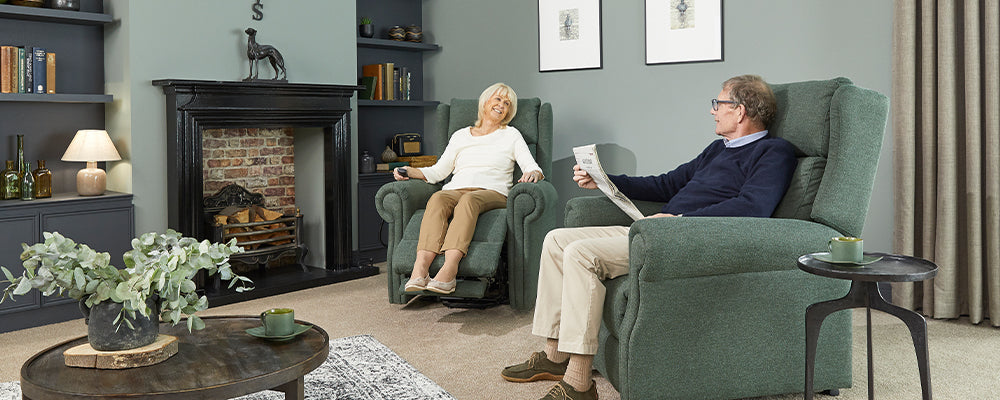Riser Recliner Chairs Explained
Riser recliner chairs are a perfect way to relax and rest. The range of elevated positions and reclining features make it easier to fall asleep and can even positively impact your health and well-being.
In this article, we’ll uncover the benefits of sleeping in a riser recliner chair, including offering a more supportive solution than a traditional chair.
We’ll also be looking at the potential drawbacks of sleeping in a riser recliner chair, such as joint stiffness or discomfort. In doing so, this will help you make an informed decision if you’re considering purchasing one for yourself.
Before we begin, it’s important to note that riser recliner chairs are not designed to be used for long periods of sleep. Instead, you may wish to consider alternative solutions like an adjustable bed or profiling care bed.
If you’re unsure if a riser recliner chair is right for you or a loved one, why not contact our team for expert advice? With over 20 years of experience, our friendly advisors can provide a consultation to find the perfect solution.
Benefits of Sleeping in a Riser Recliner Chair
Riser recliner chairs offer a wider selection of positions so you can find one that’s the most comfortable. The reclining features let you put your feet up easily and lay back with ease.
If you struggle to sleep in the chair you have because of a medical condition, limited mobility or common aches and discomfort, you may find it beneficial to sleep in a riser recliner chair.
As well as enhanced support, further benefits of sleeping in a riser recliner include:
Help ease heartburn and acid reflux symptoms
Up to 25% of UK adults are affected by heartburn, causing discomfort, chest pain and difficulty swallowing. Acid reflux occurs when stomach acid moves up from your stomach and into the throat. This causes a burning sensation, known as heartburn.
An effective way to help manage acid reflux and heartburn is by sleeping in an elevated position. This is because when you’re in an upright position, gravity assists in keeping stomach acid down and prevents it from flowing up.
As such, sleeping in a riser recliner chair can be a more comfortable option for those who suffer from acid reflux. The back of a riser recliner can be adjusted to an angle that keeps you upright. By elevating your torso above your waist by 20cm, they can help alleviate the symptoms of acid reflux. This will not only make you more comfortable, but it will also allow gravity to assist in controlling acid reflux.

Do riser recliner chairs relieve back pain?
Many people experience lower back pain which can cause discomfort and poor-quality sleep. If you or a loved one find it difficult to get in and out of an armchair, a riser recliner can make it easier. The rise and tilt feature gently assists you to a near standing position without excessive bending or force.
Often people with back pain find relief by having an extra pillow on their lower back when sleeping in a riser recliner for additional support and comfort. Furthermore, if you are recovering from surgery, being in an inclined position means riser recliners can help speed up healing and minimise strain on specific areas of the body.
Struggling to sleep at night? An adjustable bed could be the solution – book a free expert consultation with no pressure selling.
Does it reduce symptoms of sleep apnoea?
If you’re struggling with sleep apnoea, a riser recliner chair could offer relief for your symptoms. By elevating your upper body, an adjustable bed or a riser recliner chair helps to keep your airways open which reduces the likelihood of breathing difficulties. By doing so, it allows you to breathe more easily and enjoy proper rest.
Do riser recliners help if you’re pregnant?
If you're pregnant, you might find it more difficult to find a comfortable position to sleep in. However, a riser recliner chair could potentially offer some relief. By adjusting the position of the backrest and footrest, you can find a comfortable position that relieves pressure on your back and legs.
Additionally, if you experience heartburn or acid reflux during pregnancy, sleeping in an upright position can help. For those in their second and third trimester, most doctors recommend sleeping on their side rather than their backs, as it can lead to high blood pressure and poor circulation.
We recommend consulting with your local GP before using new equipment during pregnancy.

Potential Side Effects of Sleeping in a Riser Recliner Chair
Although sleeping in a riser recliner chair is generally safe and has several health benefits, it could impose several risks for some individuals.
Here are some areas to consider when sleeping in a riser recliner:
Risk of joint stiffness
Sleeping in a riser recliner chair means your knees and hips remain bent. If sleeping for longer periods (which isn’t recommended for riser recliners), it can negatively impact your posture and cause stiffness throughout your hips, calves and hamstrings.
If you are someone that has limited mobility or poor balance, stiff joints can also increase your risk of falling. It’s essential that your body weight remains evenly distributed to enhance circulation and reduce pressure. Therefore, a profiling bed with height adjustment could be a better alternative.
Potential deep vein thrombosis
Deep vein thrombosis (DVT) is where a blood clot forms within the veins of the thigh or lower leg because of bent joints and long periods of interrupted sitting. If left untreated, DVT can spread to your lungs and become very serious and potentially life-threatening.
Sleeping in a riser recliner chair instead of a bed restricts your movement and keeps the joints bent, which can increase the risk of developing DVT.
If you do sleep in a riser recliner, ensure it is for short periods and stretch out as much as possible. Reclining the backrest and elevating the footrest makes it easier to stretch. It’s also essential that you regularly move throughout the day to avoid stiffness and DVT.
Impaired circulation
Like the points above, sleeping in a riser recliner with your knees bent for extended periods can lead to reduced circulation in the lower body. Instead, keep your legs straight and elevated to encourage better blood flow. Sleeping with your legs elevated helps to reduce swelling and discomfort and mitigate the risk of blood clots/reduced circulation.
How to Sleep in a Riser Recliner
It’s important to ensure you are comfortable and properly supported when sleeping in a riser recliner chair. A few ways you can do this are:
- Sleep with your legs elevated and in front of you, if you are prone to swelling, wear compression socks
- Avoid sleeping in the chair for extended periods of time, as it is not designed for this purpose
- Keep the chair clean and well-maintained to ensure maximum comfort and safety
- Find the right angle for your body, as everyone is different and what works for one person may not work for another

Make Life Easier and Elevate Your Comfort with a Riser Recliner Chair
Riser recliner chairs are a worthwhile investment to enjoy a more comfortable experience at home. As well as having a range of health benefits, riser recliners can be a useful way to help improve your sleep routine.
However, riser recliners are not intended to be slept in for long-periods of time and there are more suitable types of mobility furniture, such as profiling beds or adjustable beds. Both offer a range of adjustments and elevated positions.
If you’re unsure which is best for you, our talented team can help and have over 20 years of experience. Contact our team to get started.








